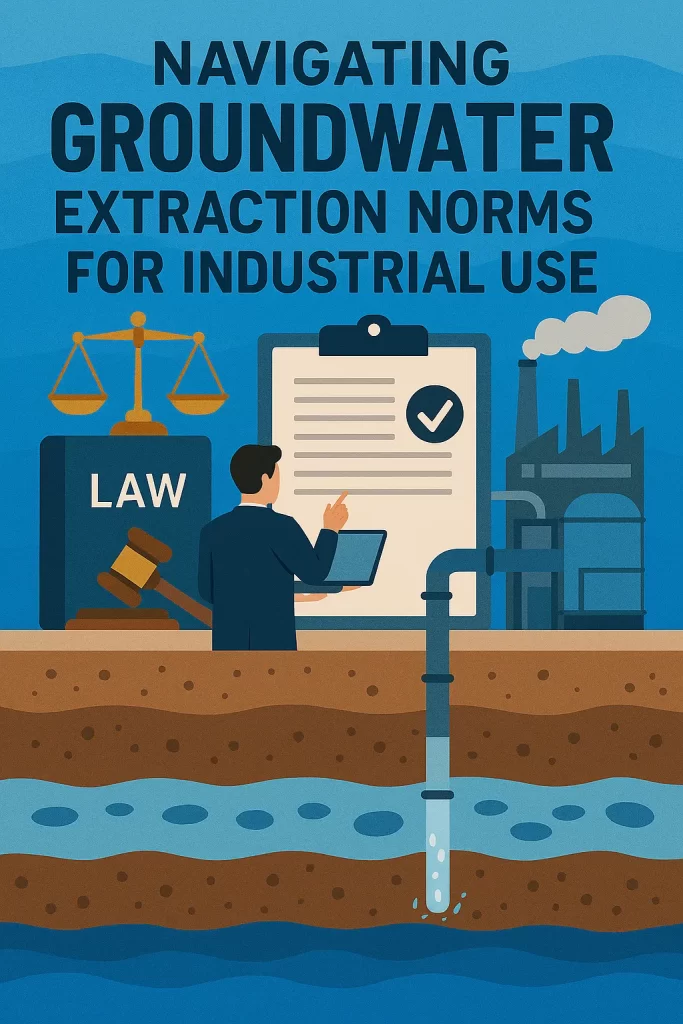The Growing Need for Industrial Water and Its Regulation
As industries in India, continue to expand, the demand for water, a critical resource, also rises significantly. Groundwater often serves as a primary source for various industrial processes. However, unchecked extraction can lead to severe consequences, including depletion of aquifers, land subsidence, and water quality degradation. To prevent these issues and ensure sustainable water management, the Government of India and state-level authorities have established specific norms and guidelines for industrial groundwater extraction.
Key Regulatory Bodies and Their Roles
Central Ground Water Authority (CGWA)
The Central Ground Water Authority (CGWA) is the primary regulatory body in India responsible for the management, control, exploration, extraction, and utilization of groundwater resources. They issue guidelines and regulations that are often adopted and implemented at the state level. For industries, obtaining a No Objection Certificate (NOC) from the CGWA is often a mandatory requirement before commencing groundwater extraction, especially for large-scale operations or in areas designated as over-exploited or critical.
Gujarat Water Resources Department (WRD)
At the state level, the Gujarat Water Resources Department (WRD) plays a vital role in implementing and overseeing water-related policies. They may have their own set of rules and regulations that complement the CGWA guidelines, tailored to the specific hydrogeological conditions of Gujarat. Industries operating in Vadodara and other parts of the state need to be aware of and comply with both central and state regulations.
Key Aspects of Groundwater Extraction Norms for Industries
Obtaining a No Objection Certificate (NOC)
For many industries, especially those with significant water requirements or operating in sensitive areas, obtaining an NOC from the CGWA is the first crucial step. The application process typically involves:
Detailed Hydrogeological Study: Assessing the availability of groundwater, its quality, and the potential impact of extraction.
Water Audit: Estimating the total water requirement and the proposed extraction rate.
Environmental Impact Assessment (EIA): Evaluating the potential environmental consequences of groundwater withdrawal.
Implementation of Water Conservation Measures: Demonstrating commitment to water efficiency and rainwater harvesting.
Extraction Limits and Monitoring
The NOC, if granted, will specify permissible extraction rates and conditions. Industries are often required to install water meters and maintain records of their groundwater usage. Regular monitoring and reporting to the concerned authorities are essential to ensure compliance. Over-extraction beyond the permitted limits can lead to penalties and the revocation of the NOC.
Restrictions in Over-Exploited and Critical Areas
In areas identified as “over-exploited” or “critical” based on groundwater availability, the norms for industrial extraction are often stricter. New NOCs may be difficult to obtain, and existing industries might face restrictions on increasing their extraction rates. In such cases, emphasis is placed on exploring alternative water sources and implementing robust water conservation measures.
Focus on Water Conservation and Efficiency
The regulatory framework increasingly emphasizes the importance of water conservation and efficient water use in industries. Industries are encouraged to adopt technologies and practices that minimize water consumption, recycle and reuse water wherever possible, and implement rainwater harvesting systems to reduce their dependence on groundwater.
Guidelines for Specific Industries
Depending on the nature of the industrial activity, there might be specific guidelines related to wastewater discharge and its potential impact on groundwater quality. Proper treatment and disposal of industrial effluents are crucial to prevent groundwater contamination.
Why Understanding These Norms Matters for Industries
Compliance with groundwater extraction norms is not just a legal obligation; it is also essential for the long-term sustainability of industrial operations. By adhering to the regulations, industries can:
Avoid Legal Penalties and Fines: Non-compliance can lead to significant financial repercussions and operational disruptions.
Ensure Business Continuity: Sustainable water management helps secure a reliable water source for the future.
Enhance Corporate Image: Demonstrating responsible water usage contributes to a positive public perception and corporate social responsibility.
Contribute to Environmental Sustainability: By using water judiciously, industries play a crucial role in protecting precious groundwater resources for future generations.
How Vishal Borewell Can Assist You
At Vishal Borewell, based in Vadodara, we understand the complexities of groundwater extraction norms for industrial use in Gujarat. With our extensive experience in borewell drilling and water resource management, we can assist industries by:
Providing expert consultation on the regulatory requirements and NOC application process.
Conducting hydrogeological surveys to assess groundwater availability and quality.
Designing and installing efficient and compliant borewell systems.
Offering guidance on water metering, monitoring, and reporting requirements.
Advising on and implementing rainwater harvesting and water conservation measures.
Contact Vishal Borewell today to ensure your industrial water extraction practices align with the prevailing norms in Gujarat and contribute to sustainable water resource management.
Conclusion: Responsible Groundwater Use for a Sustainable Industrial Future
Understanding and adhering to groundwater extraction norms is paramount for industries in Gujarat. By embracing responsible water management practices and working with experienced partners like Vishal Borewell, industries can ensure their operational sustainability while contributing to the conservation of this vital natural resource. Let’s work together towards a future where industrial growth and environmental stewardship go hand in hand.
